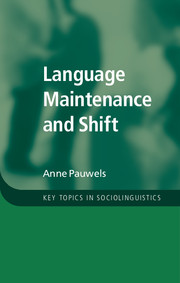Book contents
- Frontmatter
- Dedication
- Contents
- Acknowledgements
- Introduction
- PART I HISTORY, CONCEPTS, CONTEXTS AND APPROACHES
- PART II INVESTIGATING LANGUAGE MAINTENANCE AND SHIFT: COLLECTING AND ANALYSING DATA
- 3 Linguistic demography: Census surveys
- 4 Reporting language use and exploring language attitudes: Questionnaires
- 5 Beyond surveys: Interviews, participant observation and experiments
- PART III IDENTIFYING AND UNDERSTANDING TRENDS AND PATTERNS IN THE DYNAMICS OF LANGUAGE MAINTENANCE AND SHIFT
- PART IV LANGUAGE MAINTENANCE EFFORTS AND REVERSING LANGUAGE SHIFT
- PART V FUTURE DEVELOPMENTS IN THE STUDY OF LANGUAGE MAINTENANCE AND SHIFT
- References
- Index
- References
5 - Beyond surveys: Interviews, participant observation and experiments
from PART II - INVESTIGATING LANGUAGE MAINTENANCE AND SHIFT: COLLECTING AND ANALYSING DATA
Published online by Cambridge University Press: 05 August 2016
- Frontmatter
- Dedication
- Contents
- Acknowledgements
- Introduction
- PART I HISTORY, CONCEPTS, CONTEXTS AND APPROACHES
- PART II INVESTIGATING LANGUAGE MAINTENANCE AND SHIFT: COLLECTING AND ANALYSING DATA
- 3 Linguistic demography: Census surveys
- 4 Reporting language use and exploring language attitudes: Questionnaires
- 5 Beyond surveys: Interviews, participant observation and experiments
- PART III IDENTIFYING AND UNDERSTANDING TRENDS AND PATTERNS IN THE DYNAMICS OF LANGUAGE MAINTENANCE AND SHIFT
- PART IV LANGUAGE MAINTENANCE EFFORTS AND REVERSING LANGUAGE SHIFT
- PART V FUTURE DEVELOPMENTS IN THE STUDY OF LANGUAGE MAINTENANCE AND SHIFT
- References
- Index
- References
Summary
BEYOND SURVEYS AND QUESTIONNAIRES
Talking with people about their language use (interviews) and observing how people use languages in a range of settings (participant observation) are probably the two most frequently used methods, besides questionnaires, in the exploration of LM and LS. Experiments and tests are another tool, although these are used primarily for investigating attitudes and linguistic proficiency.
Even when the research is more quantitatively focused, such as in large-scale language surveys, it is sometimes complemented with a small sample of interviews in which a more detailed discussion about language use and language choice takes place. Where the focus of the research is on the language behaviour and language choice of a specific community or group, such as Maori adults in Wellington, New Zealand; Bangladeshi children in London; Puerto Rican youngsters in New York or Turkish immigrant women in Hamburg, Germany, interviewing members of these groups and communities is the standard way of exploring relevant language issues. Participant observation is also a common way of investigating language behaviour as it allows researchers to observe actual linguistic behaviour and practices in various settings or locations rather than having to rely on self-reports.
In the following sections we will discuss these main ‘other’ tools for researching language practices in the context of LM and LS. Section 5.2 deals with the interview, followed by Section 5.3 on participant observation. In Section 5.4, we discuss the use of experiments in exploring attitudes towards language use. In Section 5.5, we touch upon some other ‘methods’ that are used in exploring questions of LM and LS. These could be collectively described as biographic and/or autobiographic narratives.
INTERVIEWS
We have repeatedly noted that the question ‘Who speaks what language to whom, when, where and to what end/for which purpose?’ has become the guiding beacon for the exploration of language-use patterns in multilingual settings, through either written questionnaires or interviews. In fact, if an interview is used to pursue this question in the context of macro-oriented research, then such an interview is best described as an interviewer-administered questionnaire. In such an interview, the content of questions will be very similar to that discussed in relation to written questionnaires. However, more attention may need to be paid to the formulation of questions. For example, using more open-ended questions may be more suitable in such situations.
- Type
- Chapter
- Information
- Language Maintenance and Shift , pp. 64 - 80Publisher: Cambridge University PressPrint publication year: 2016



